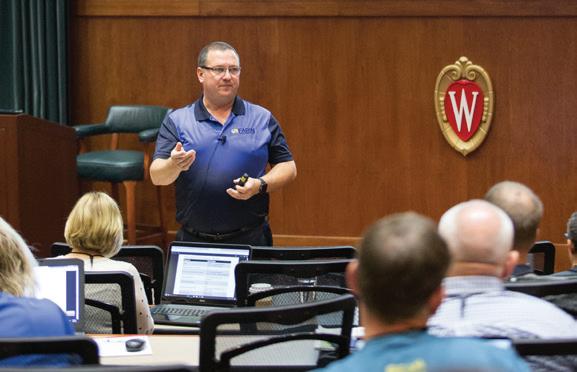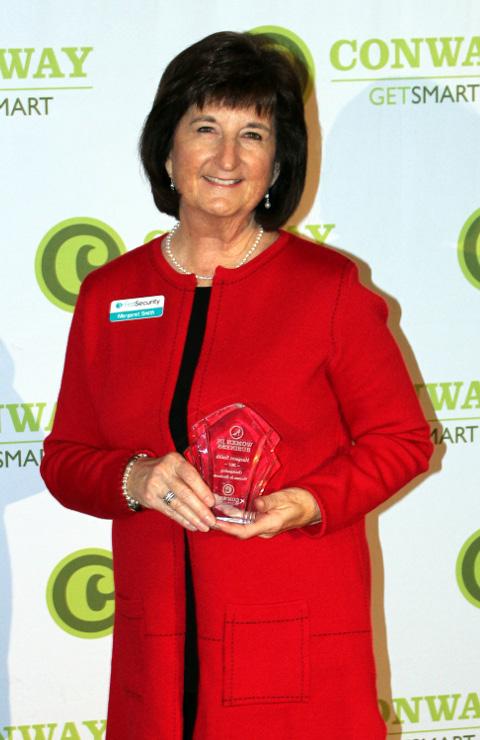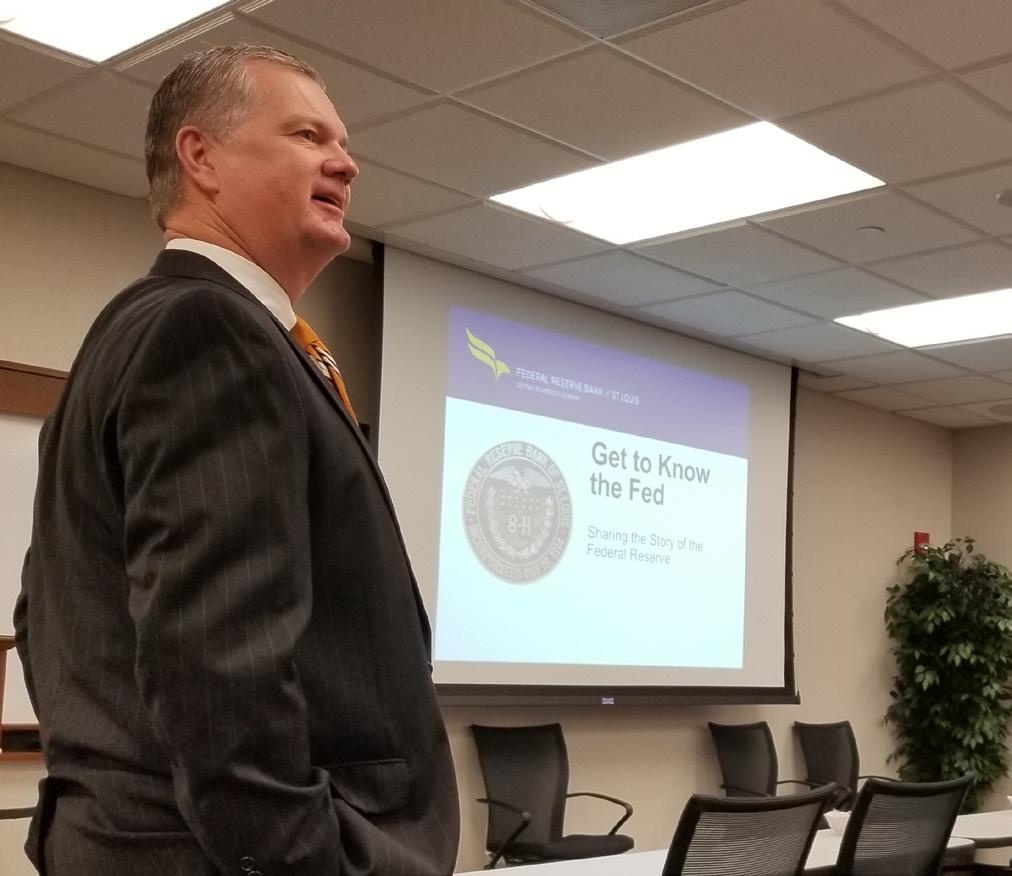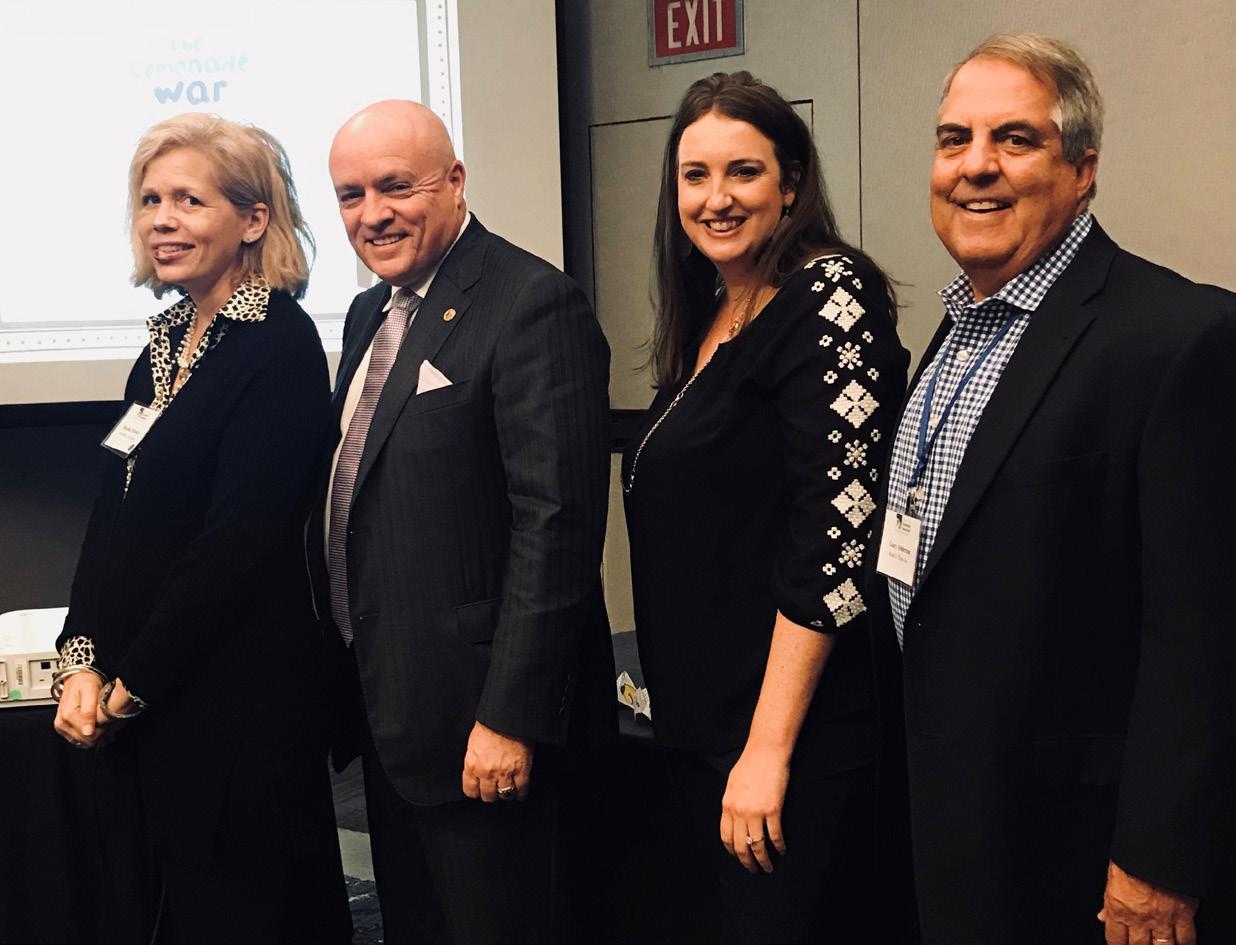
10 minute read
Faces of the ABA
RYAN MOORE Centennial Bank Jonesboro
NATALIE BARTHOLOMEW Grand Savings Bank Rogers
What do you see as the biggest issue facing community bankers in Arkansas? I’ll give you the three biggest issues: regulation, regulation, and regulation. Specifically, how the increase in regulations are making it more difficult to serve our customers in Arkansas. Community banks in Arkansas shouldn’t be regulated the same as Wall Street banks in New York. What made you decide to become a banker? I have always known that I wanted to be a banker. I essentially grew up at Farmers & Merchants Bank of Prairie Grove, which was later purchased by Arvest. My grandfather worked there for 45 years and would bring home bank tickets to my sister and me. I had no idea what they really were, but I played “bank” all the time. As a high school student, I was a member of the Arvest Junior Bank Board and bugged the bank sponsors constantly about working there. It has always been in my blood to be in this industry and I hope to see more young women have the same aspirations.
GEORGE PURVIS Cornerstone Bank Eureka Springs 2017-18 ELS COUNCIL VICE PRESIDENT EVELYN WADE First Financial Bank El Dorado 2017-18 ELS COUNCIL TREASURER What trait must today’s banker possess to be successful? In order to be successful, today’s banker must be adaptable. We live in an environment of ever- changing technology, evolving regulations, and balancing cross-generational customer expectations. Our society thrives on instant gratification; therefore, we must be able to meet the needs of our customers quickly as industry wide changes occur. Successful bankers do this by implementing and utilizing the latest technological advances, staying educated and knowledgeable of upcoming regulatory changes, and developing strategies to serve customers across generations. Delay in change could result in loss of business or failure. One must be responsive to change in order to stay on track to success. CAMERON HURST Gateway Bank Rison What trait must today’s banker possess to be successful? Personalized service. Always make the person in front of you feel like they are your most important customer. Modern day banking regulations can make things difficult for borrowers, so always try to simplify the process for them. A great customer can always find another bank, but they can’t always find great service. SANDY STARNES Citizens Bank Batesville What trait must today’s banker possess to be successful? Whether focus is product innovation, operational efficiencies or regulatory climate, today’s banker must possess two characteristics to be successful: agility and vision. We must have the vision to plan for tomorrow and the agility to pivot when the unexpected happens. ROBERT HARGIS Citizens Bank Monticello What made you decide to become a banker? Becoming a banker was an easy choice for me. Banking presents a unique opportunity to exercise my interest in financial matters as well as getting to know people and their businesses in our community. It has been very rewarding to help friends and neighbors either get through a tough spot or make their lifelong dreams become reality. Local bankers are also deeply involved in the communities that we serve and love.
What made you decide to become a banker? Seeing the possibility of a career in which I could help people achieve their dreams, have a positive impact on the local economy, be involved day to day in our community… all the while working for a family-owned company whose core values matched my own just seemed like a good fit. Besides, who doesn’t like giving away money?
EDUARDO ABRIL First State Bank of DeQueen DeQueen
What do you see as the biggest issue facing community bankers in Arkansas? One of the biggest issues we face as community bankers is over regulation and the cost to remain in compliance. Community banks do not usually have the resources that larger banks have to deal with the mounting number of regulations. Another issue I think we face is keeping up with the high cost of technology and how fast it changes.
What trait must today’s banker possess to be successful? It’s essential for today’s banker to possess the ability to adapt. We as bankers are in an industry of constant regulatory and technological change but more importantly our clients are in an ever-changing business environment. The way they conduct their business in today’s marketplace is completely different from how their companies have historically operated and to certain extents the way they even operated their business in recent years. Having the ability to adapt to our customer’s changes in their business & financial processes while still being able to provide services & solutions will be the key factor to success moving forward.
JAMES LYLE McGehee Bank McGehee
What trait must today’s banker possess to be successful? An eagerness to learn. Whether in your area, or elsewhere in the institution, a hunger for knowledge will set you up for success. “Wisdom is not a product of schooling but of the lifelong attempt to acquire it.” - Albert Einstein
BRYCE LARRY Legacy National Bank Rogers
What do you see as the biggest issue facing community bankers in Arkansas? In my opinion, the biggest issue facing community bankers in Arkansas is the uncertainty surrounding the regulatory environment and the decision makers at the Federal Reserve. Community banks are trying to make decisions today not knowing the path of regulation in the short-term or long-term. Community banks must build systems and processes to keep up with ever-changing regulation. Even small changes to regulation can impact smaller banks in a significant way. The disorder in Washington currently has led to a large amount of uncertainty in regard to regulation moving forward.
BLAKE JOHNSON Evolve Bank & Trust Jonesboro
What made you decide to become a banker? My parents were both bankers, it was all I knew of- but the ever-changing landscape in which we practice keeps me excited and ever-learning.
J.D. CHAMBLISS First Security Bank Rogers
What do you see as the biggest issue facing community bankers in Arkansas? The biggest issue currently facing Arkansas community bankers is the burden of regulatory compliance. This burden costs Arkansas community banks of all sizes a great deal of time and money each year. Additionally, federal tax reform will be an area of focus for Arkansas community bankers moving forward. Federal tax reform will not only impact Arkansas community bank customers but could also change the way credits are underwritten and analyzed by lenders.
RACHAEL SCHWARTZ-POTTER Farmers Bank & Trust Texarkana
What do you see as the biggest issue facing community bankers in Arkansas? I would say keeping up with rapidly evolving technology is the biggest issue facing community bankers in Arkansas.
DAVID JOHNSON Southern Bancorp Trumann
What made you decide to become a banker? I started as a part time teller when I was in grad school, but didn’t have any real plans of making banking a career until about the time I graduated. I loved the idea of getting to work with different types of businesses and learning how they operate. Banking stays interesting because every day presents new challenges and opportunities.
Best Practices for Enhancing the Debit Chip-Card Experience
by Bryan Manka PULSE Network In October 2015, a fraud liability shift was introduced to the party that has not adopted EMV chip technology. This shift prompted a transition to chip-enabled credit and debit cards and POS terminals. As of January 2017, an estimated 90 percent of U.S. debit cards were chipbased, according to the 2017 Debit Issuer Study, commissioned by PULSE and conducted by Oliver Wyman. While many major merchants were early adopters of the technology, smaller retailers have been slower to make the transition. The gradual transition to chip-based transactions, combined with the requirements of Regulation II implementing the Durbin Amendment and changes in cardholder verification method (CVM), have created a chip card acceptance landscape in the U.S. that varies widely from card to card, and from merchant to merchant. In many instances, debit transactions are approved as consumers would normally expect. In other cases, cardholders may be asked to sign in a merchant environment where they would normally use their PIN, eliminating the option to receive cash back. In rare instances, the transaction may fail and the consumer will have to use another payment option. They also may be asked to choose between a global network brand and “U.S. debit” when completing chip-card transactions. To understand what banks can do to help their customers cope with this disparity of experiences, it’s important to first understand the factors that contribute to it.
LAYERS OF COMPLEXITY There are several layers of complexity involved in the U.S. transition to chip cards: Regulation II. Among other things, this regulation requires financial institutions to enable at least two unaffiliated networks on each debit card and enables merchants to determine routing priority among the enabled networks. U.S. chip debit cards must have at least two application identifiers (AIDs) to be compliant, and to facilitate merchant routing choice: a global AID from the payment brand on the card (Discover, Mastercard or Visa) and a U.S. Common Debit AID. The common AID enables routing
14 The Arkansas Banker | December 2017 to any of the supported brands on the card, including unaffiliated debit networks. Card Network Combinations. U.S. debit cards have one of three primary card brands and at least one unaffiliated debit network (but often two or three). This means cards can have dozens of possible combinations of enabled networks. Enablement Order. Because most banks enabled their credit cards with chips before their debit cards, merchants made a similar choice, enabling their terminals first for chip-based credit transactions. This means they enabled the global AIDs before U.S. Common Debit AIDs, and signature authorization before PIN authorization, in many cases. Many chip-accepting merchants still have not enabled the common AIDs. Depending on where each merchant is in the implementation process, the result is a wide variety of cardholder experiences. CVM Options. Many debit networks now support PINless POS transactions – and in the case of PULSE, even signature transactions. This blurs the lines between PIN and signature debit and has added another layer of uncertainty to the cardholder experience with chip cards.
Terminal Configurations. Merchants and their acquirers make a number of choices when configuring payment terminals. These include preferences for AID selection and PIN, signature or PINless verification preference. Network Routing Choice. Acquirers make routing decisions based on the transaction information captured by the terminal.
SUGGESTED BEST PRACTICES FOR ISSUERS To assist your cardholders in navigating this complex environment, we suggest the following best practices: 1. If you haven’t already done so, enable a common AID on all of your debit cards as soon as possible. If you issue PIN-only cards that are not enabled on one of the primary debit networks, license a shared AID from the Debit Network Alliance for those cards. 2. Encourage merchants that have retail accounts at your bank to support a U.S. Common Debit AID to help maximize their routing choices, reduce costs and improve the cardholder experience. 3. Educate your cardholders about the different verification methods they are likely to encounter in different merchant environments. Let them know that some fast-food restaurants and grocery stores often opt to use PINless debit for lower-value transactions. 4. Inform cardholders that they may encounter terminals that ask the consumer to choose the AID by asking them to select either “U.S. Debit” or a branded network. Suggesting the U.S. Debit option will maximize the routing options and reduce your costs. 5. Help your customers understand that their experience at the terminal may vary between PIN, PINless and signature verification. Similarly, they may be asked to verify mobile payments with their fingerprint or with their fingerprint and PIN. Let them know that this variation may persist for the foreseeable future. For more information on U.S. Common Debit AIDs, visit debitnetworkalliance. com or uspaymentsforum.org.
Bryan Manka is Senior Product Manager, Emerging Payments, for PULSE, a Discover Financial Services company headquartered in Houston, Texas. He is responsible for PULSE’s product strategies involving EMV, tokenization and other select technologies. ABOUT THE AUTHOR
EDUCATING PROFESSIONALS, CREATING LEADERS

More than $225,000 in Scholarships Available Annually

The Arkansas Bankers Association is pleased to offer scholarship opportunities to its member bankers through the Herbert V. Prochnow Educational Foundation, a supporting organization to the Graduate School of Banking at the University of Wisconsin – Madison. The GSB Prochnow Foundation offers nearly one quarter million dollars in scholarships every year to bankers who want to improve their careers and organizations through education.
Scholarships are distributed through the ABA for the Graduate School of Banking and the GSB Human Resource Management School. Apply today for a scholarship to attend a program at the nation’s leading and most progressive banking school. For details, contact Kami Coleman at the Arkansas Bankers Association at kami.coleman@arkbankers.org.
Sponsored by:











